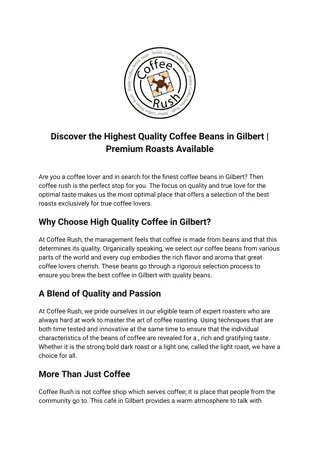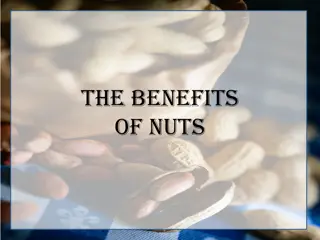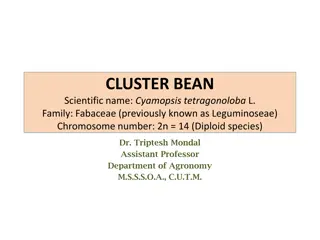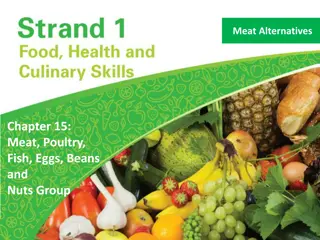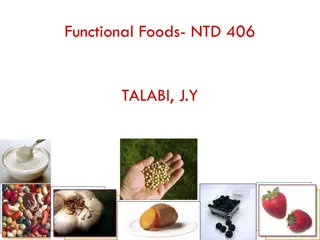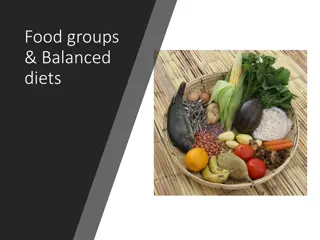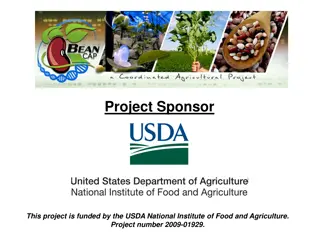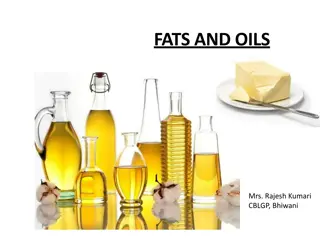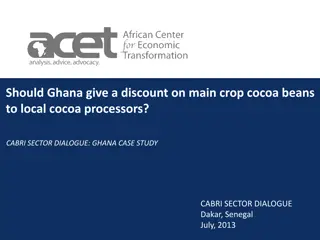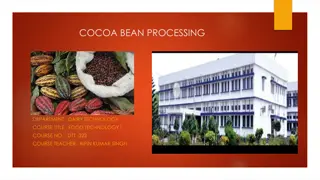Exploring Beans, Nuts, Pulses, and Soya Bean Products
Delve into the world of beans, nuts, pulses, and soya bean products. Learn about the different types, structures, and nutritive value of these ingredients. Discover how to choose, store, and use them in cooking. Understand the significance of legumes, nuts, and pulses in a balanced diet and nutrition. Unveil the diverse forms and varieties of beans, nuts, and pulses, and explore their culinary versatility.
Download Presentation

Please find below an Image/Link to download the presentation.
The content on the website is provided AS IS for your information and personal use only. It may not be sold, licensed, or shared on other websites without obtaining consent from the author. Download presentation by click this link. If you encounter any issues during the download, it is possible that the publisher has removed the file from their server.
E N D
Presentation Transcript
Understanding Ingredients Beans, Nuts, Pulses and Soya Bean Products
Topics Types of Beans, Nuts, Pulses and Soya Bean Products Structures of Beans, Nuts, Pulses and Soya Bean Products Nutritive Value of Beans, Nuts, Pulses and Soya Bean Products Choice and Storage of Beans, Nuts, Pulses and Soya Bean Products Uses of Beans, Nuts, Pulses and Soya Bean Products in Cooking / Diet Food and Nutrition Labelling of Beans, Nuts, Pulses and Soya Bean Products 2
Types of Beans, Nuts, Pulses and Soya Bean Products 3
Types of Beans, Nuts, Pulses and Soya Bean Products The term "legume" refers to the plants whose fruit is enclosed in a pod When growing, legumes fix nitrogen into the soil, which reduces the need for chemical fertilizers A legume fruit is a simple dry fruit A common name for this type of fruit is a pod Well-known legumes include alfalfa, fresh peas, soya bean and peanuts 4
Types of Beans, Nuts, Pulses and Soya Bean Products Bean Bean is the edible nutritious seed of various plants of the legume family, especially of the genus Phaseolus Some bean types include: Broad bean or fava bean Soya bean Common beans includes kidney bean , black bean, green bean , snap bean , string bean and many others Adzuki bean Mung bean Cowpea 5
Types of Beans, Nuts, Pulses and Soya Bean Products Nuts Nuts consists of a kernel inside a hard shell The kernels are parts which we eat Peanuts are pulses, they are the seed from pods and often referred to as nuts 6
Types of Beans, Nuts, Pulses and Soya Bean Products Pulses Pulses are part of the legume family, but the term pulse refers only to the dried seed Peas, lentils and chickpeas are the most common varieties of pulses Pulses come in a variety of shapes, sizes and colours Pulses can be consumed in many forms including whole or split, ground into flours 7
Types of Beans, Nuts, Pulses and Soya Bean Products Soya Bean Products Soya bean products are plant foods rich in proteins, they are often used to replace meat in vegetarian diet Soya beans can be made into many products: Soya bean sprouts Soya bean milk Bean curd / tofu Bean curd sheet ( ), bean curd skin ( ), bean curd stick ( )and bean curd strip ( ) Fried bean curds and bean curd puffs Fermented bean curds Soya bean oil Soya flour Soya sauce 8
Types of Beans, Nuts, Pulses and Soya Bean Products Soya bean sprouts Soya bean milk They are used as vegetables Soya bean milk in the market could be plain, sweetened, flavoured, fortified with minerals or vitamins It is similar in food value to that of cow s milk 9
Types of Beans, Nuts, Pulses and Soya Bean Products Bean curd (tofu) Bean curd (tofu) is also known as soybean curd, made by curdling fresh hot soy bean milk with a coagulant Traditionally, the curdling agent used to make bean curd is calcium sulphate, a naturally occurring mineral found in natural ocean water The liquid milk is set and the curd is cut into pieces to form bean curd Types of bean curd: Soft / firmed / wrapped / boxed bean curd 10
Types of Beans, Nuts, Pulses and Soya Bean Products Tofu (bean curd) (cont d) Soft / firmed /wrapped / boxed bean curd A smooth creamy curd Pressed bean curd Making pressed bean curd is similar to that of making bean curd It is pressed so that all liquid is removed and the texture is made harder than that of soft bean curd It may be plain or flavoured Bean curd custard It has a soft texture The amount of calcium sulphate added to make bean curd custard is less than that of bean curd It can be served hot and cold, sweet or savoury 11
Types of Beans, Nuts, Pulses and Soya Bean Products Bean curd skin When soya bean milk is boiled, the soya protein denatures and form a skin on the surface Fried bean curds and bean curd puffs They are bean curds which have been deep fried Fermented bean curds They are bean curds which have been fermented They may be used as flavourings 12
Types of Beans, Nuts, Pulses and Soya Bean Products Soya flour It is made by grinding soya beans into powder form Soya flour may be added to cakes, biscuits and bread to increase the protein content It is also used in meat and fish pastes, and vegetarian meats Soya sauce It is a seasoning made from fermented soya beans It is used as seasoning for savoury dishes, e.g. soya eggs 13
Types of Beans, Nuts, Pulses and Soya Bean Products Textured vegetable protein (TVP) In recent years, soya beans have been processed to form many meat-like products, called meat analogues , e.g. textured vegetable protein (TVP) They are useful source of essential amino acid, particularly for those adopting a vegetarian diet The composition of textured soybean proteins is extremely variable because it depends on the manufacturing process as well as on the ingredients used They are extremely low in fat and rich in proteins 14
Nutritive Value of Beans, Nuts, Pulses and Soya Bean Products 15
Nutritive Value of Beans, Nuts, Pulses and Soya Bean Products Beans are high in protein Beans have significant amounts of fibre Beans are high in folate Beans are high in iron 16
Nutritive Value of Beans, Nuts, Pulses and Soya Bean Products Nuts Nuts contain low biological value proteins Nuts have higher energy value than pulses All nuts contain dietary fibre, vitamin B complex, iron and calcium Different types of nuts have different amount of proteins, e.g. 100 g almonds contain 17 g plant proteins but 100 g chestnuts only contain 2 g plant proteins 17
Nutritive Value of Beans, Nuts, Pulses and Soya Bean Products Pulses Pulses are rich in protein but the protein is low in biological value Pulses are very high in fibre Pulses have higher energy value and dietary fibre than other vegetables Pulses are low in fat Pulses have high levels of minerals such as iron, zinc, and phosphorous Pulses have high levels of folate and other B-vitamins 18
Nutritive Value of Beans, Nuts, Pulses and Soya Bean Products Soya Bean Products Soya bean is rich in plant proteins but the protein is low in biological value Soya bean provides us with carbohydrates Soya bean is low in saturated fat and contains no cholesterol Soya bean is a good source of vitamin B complex Soya bean is rich in calcium, phosphorous and iron When the curdling agent used to make bean curd is calcium sulphate, the bean curd is an excellent source of calcium 19
Choice and Storage of Beans, Nuts, Pulses and Soya Bean Products 20
Choice and Storage of Beans, Nuts, Pulses and Soya Bean Products Choosing pulses and nuts Pulses and nuts should be of good colour They should be unbroken and free from insects Storing pulses and nuts Store pulses and nuts in air-tight containers and keep in a dry airy place If store properly, they can be kept for a few months 21
Choice and Storage of Beans, Nuts, Pulses and Soya Bean Products Choosing soya bean milk and other packed products The package should be intact Check the expiry date There should not be clotted substances Storing soya bean milk and other packed products Store in a refrigerator Use according to date label 22
Choice and Storage of Beans, Nuts, Pulses and Soya Bean Products Choosing fresh bean curd The colour should be creamy white The bean curd should not be broken There should not be unpleasant smell Storing fresh bean curd Soak in water during storage Store in refrigerator and use on the day it is bought 23
Choice and Storage of Beans, Nuts, Pulses and Soya Bean Products Choosing bean curd sold in packets The colour should be creamy white The bean curd should not be broken Check the expiry date Storing bean curd sold in packets Store in refrigerator Use according to date label 24
Choice and Storage of Beans, Nuts, Pulses and Soya Bean Products Storage of Other Soya Bean Products Soya bean sprouts should be soak in a bowl of water and eat on the day it is bought Soya bean milk should be put in the refrigerator once it is opened Bean curd custard should be kept in the refrigerator and be eaten within 1 or 2 days 25
Uses of Beans, Nuts, Pulses and Soya Bean Products in Cooking / Diet 26
Uses of Beans, Nuts, Pulses and Soya Bean Products in Cooking / Diet Examples of dishes made from bean and pulses: Pea soup Bean salad Chili con carne Baked beans Hummus Peanut brittle Red bean sweet soup 27
Uses of Beans, Nuts, Pulses and Soya Bean Products in Cooking / Diet Examples of uses of nuts: Eaten as snacks (trail mix) Topping or ingredient on baked goods (e.g. walnut cookies, muffin) Ingredient in main course (chicken and chestnut stew) Ingredient in sauce (pesto sauce) Ingredient in dessert (almond sweet soup) 28
Uses of Beans, Nuts, Pulses and Soya Bean Products in Cooking / Diet Examples of uses of bean curd: Soy sauce stewed bean curd Fish head and tofu soup Steamed meatloaf with bean curd Braised bean curd Spicy Sichuan tofu Pan-fried stuffed bean curd 29
Food and Nutrition Labelling of Beans, Nuts, Pulses and Soya Bean Products 30
Food and Nutrition Labelling of Beans, Nuts, Pulses and Soya Bean Products Labelling of convenience / processed food is controlled in Hong Kong legislation: List of ingredients Pre-packaged food shall be legibly marked or labelled with a list of ingredients List of allergenic substance If a food consists of or contains any of the following substances Peanuts, soya beans and their products; Tree nuts and nut products The name of the following substances shall be specified in the list of ingredients 31
Food and Nutrition Labelling of Beans, Nuts, Pulses and Soya Bean Products Labelling of convenience / processed food is controlled in Hong Kong legislation: Appropriate durability indication Indication of best before or use by date Nutrition labelling Pre-packaged food shall be marked or labelled with its energy value and nutrient content Nutrition claim If any nutrition claim is made on the food label or in any advertisement, the nutrient in concern shall be marked or labelled in the nutrition labelling 32
References Conforti, F. D. (2008). Food selection and preparation: a laboratory manual. Ames, IA: Wiley-Blackwell. Garlough, R. (2011). Modern food service purchasing. Clifton Park, N.Y.: Delmar Cengage Learning. Vickie A. Vaclavik, Elizabeth W. Christian. Essentials of food science. New York, NY: Springer, c2008. Pulse Canada. Siddiq, M., & Uebersax, M. A. (2013). Dry beans and pulses production, processing, and nutrition. Ames, IA, USA: Wiley-Blackwell. 33






